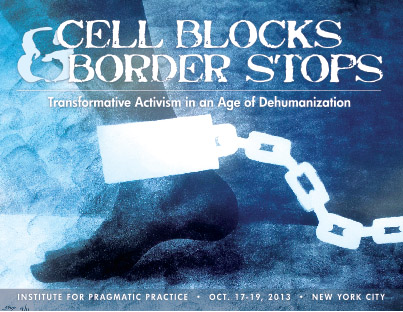Confirmed speakers include: Cornel West, john powell, Pramila Jayapal
Transformative Activism in an Age of Dehumanization
Join us as we bring together hundreds of organizers, academics, policy leaders, journalists, and grassroots activists to examine the intersection of immigration control and mass incarceration, and to consider the future of activism and organizing in these areas.
Organized by the Alliance for a Just Society’s Institute for Pragmatic Practice, in conjunction with national and local collaborators, the symposium will:
- Deepen and strengthen the relationships between organizing around criminal justice and immigration
- Develop a shared analysis of the role of race, dehumanization and disposability within both immigration control and mass incarceration.
- Identify new organizing opportunities and initiatives in these areas centered on personhood and racial justice.
Cell Blocks and Border Stops
In the last four decades, mass incarceration and immigration control in the US has skyrocketed.
The US incarcerates more of its population than any other country in the world—rates unmatched in modern history. At the same time, immigrant deportations and detentions that have reached all time highs during the last four years place more people under and/or in fear of control by the criminal justice system Today, more than seven million people are under control of the criminal justice system (prison, probation, parole or detention) exceeding the combined populations of Brooklyn, Queens, Manhattan, and Staten Island. Eleven million immigrants—roughly the population of Ohio–are out of compliance with federal immigration law, and at constant risk for harassment, detention, and deportation.
Counting friends, families, colleagues, and neighbors, tens of millions of people today are directly affected by the sprawling immigrant control and criminal justice systems. Poor Black and Brown people have been born this burden most heavily, driven by long-standing beliefs in racial inferiority and white supremacy.
But these systems leave few untouched. One in three people in the US will be arrested by the time they turn 23. Cumulatively, the nation will spend $80 billion this year to keep two million people behind bars. Fueled by a moral ideology insisting on punitive retribution and incapacitation, these systems have often worsened the poverty, violence, and powerlessness they claim to address.
The cellblock has become the solution of choice for many of the crises the US faces today: Poverty, addiction, violence, family abuse, homelessness, and large-scale displacement and migration. Systems of mass incarceration and immigration control are deeply interrelated. These transformations have depended on deeply dehumanizing accounts of those behind bars or without proper documentation. As “criminals” and “illegals” they are expelled from public life, forfeiting any claims to act and speak about our world. They are constantly invoked as threats to freedom and safety, yet disappeared from public view and consciousness.
New Opportunities
At the same time, a growing chorus of activist groups, legal advocates, think tanks, foundations, journalists, and policymakers, suggested by a variety of trends:
- The passage in California of Proposition 36, relaxing the notorious “Three Strikes” sentencing enhancement law approved by California voters in 1994.
- The passage of laws in nearly a dozen states decriminalizing marijuana possession and sale in some circumstances.
- New exit polling data from the recent election suggesting that a majority of voters now support a path to citizenship for unauthorized immigrants in the US.
- The emergence of a “Right on Crime” network of conservative leaders calling for reforms in the criminal justice system and reducing reliance on incarceration.
Thus, during Obama’s second term, multiple reforms related to incarceration and immigration control will be considered.
How can we utilize this opening to transform, rather than merely reform (and thus legitimate), systems of mass incarceration and immigration control? What insights can prison and immigration activists learn from one another? How can this organizing incorporate and mobilize new constituencies? How can we challenge and transform the dehumanizing ideas that undergird these systems, and make visible the voices, experiences and ideas that these systems seek to erase? In short, how can we ensure that the personhood of many millions of people shaped by these systems is centered in this debate?
Outcomes
- To deepen and strengthen the relationships between organizing around criminal justice and immigration
- To develop a shared analysis of the role of race, dehumanization and disposability within both immigration control and mass incarceration.
- To identify new organizing opportunities and initiatives in these areas centered on personhood and racial justice.
- Our Economy: Envisioning and Organizing for Economic Justice Beyond Capitalism, September 6-7, 2012
- Building Progressive Power in Rural America, March 28-30th 2012
- Health Equity- Beyond Health Care Reform, March 11, 2011
- Put Your Money Where Your Heart Is: Building Progressive State Budgets that Reflect Our Values May 26-27, 2010
